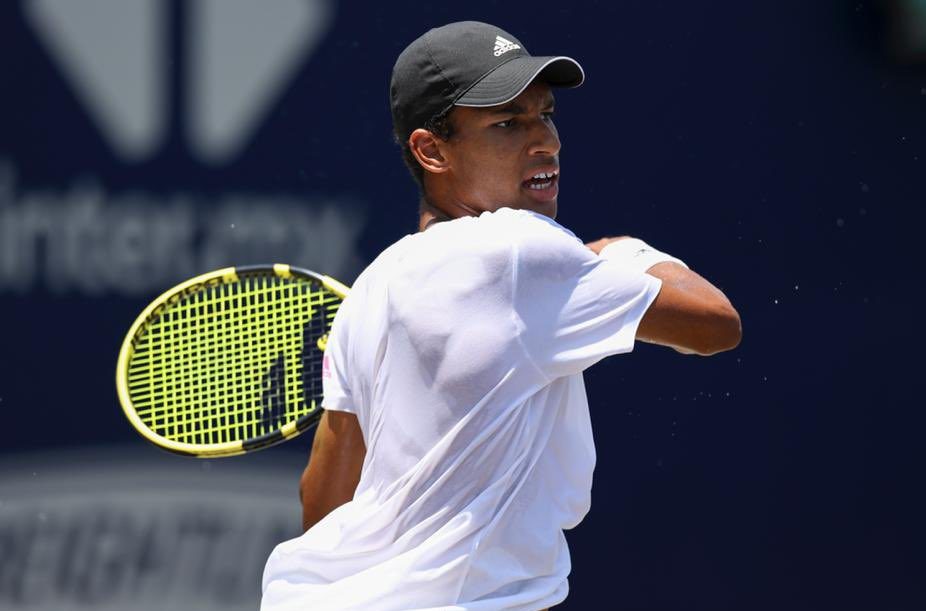
Photo : @AbiertoLosCabos
Félix here, Félix there, Félix everywhere.
While he said himself that he’s feeling calm and serene—and that’s what’s most important—feverish fans are counting down the hours until the sixth seed at the National Bank Open presented by Rogers takes the stage on Wednesday, at an IGA Stadium that’ll be packed to the rafters.
But first, we’ve got to determine his opponent between No.54 Yoshihito Nishioka, who was an unexpected finalist in Washington last week, and No.104 Benoît Paire.
To make the wait a little more bearable, we asked four experts to rely on their expertise and peer into their crystal ball to tell us how they think Félix’s week will go. They are Eugène Lapierre, senior vice-president at Tennis Canada and director of the National Bank Open in Montréal; Réjean Genois, the first Canadian in the ATP Top 100 and president of Tennis Québec for 33 years; Jacques Hérisset of Club Avantage where Félix learned the basics and Martin Laurendeau, long-standing captain of Canada’s Davis Cup team.
How far will Félix go?
EUGÈNE LAPIERRE: Right now, I just want Félix to get through the first test, and then we’ll see. The draw everyone said was in his favour on Friday has changed. He’ll play the winner between Benoît Paire and Yoshihito Nishioka, who should have gone through the qualification rounds but got an exemption because he was in the final in Washington. He lost to Kyrgios and eliminated Brooksby, de Minaur, Khachanov and Evans, in that order. Féix won’t know who his opponent is until late Tuesday (Nishioka has earned as much rest as possible after his run in Washington!).
RÉJEAN GENOIS: I think Félix will win his first Masters here at home, in front of his fans.
JACQUES HÉRISSET: I hope we’ll see Félix in the quarters, especially since I’ve got tickets for both sessions on Friday.
MARTIN LAURENDEAU: Félix was looking good when I ran into him in the locker room. We’ll have to see. There are a few gaps in the draw. That said, with a first match, it’s always better to err on the side of caution.
What does he have to do well and do better in Montréal?
EUGÈNE LAPIERRE: Stay calm, be patient in the rallies, rely on the natural power of his shots to overwhelm his opponents, just like he showed us he could last spring.
RÉJEAN GENOIS: He needs to serve well because his serve—and especially his first serve—has become one of the best in the game.
JACQUES HÉRISSET: His serve, which is his weapon, has to be working so he can follow-up with the forehand and capitalize on the break points so things don’t drag on.
MARTIN LAURENDEAU: He has enough experience and needs to use his game patterns to hit good shots. It’ll be interesting to see how much time he spends at the baseline and the net. I’m not saying he should rush, but moving up the court will give him more speed. The surfaces are neither fast nor slow. Félix should like that.
Is the pressure a motivator or a concern?
EUGÈNE LAPIERRE: First and foremost, the pressure comes from outside expectations—from the fans, the media and everyone around. And there are a lot of expectations in Montréal. It’s a bit different from the pressure that comes with the reality of stepping onto centre court at Roland-Garros or Wimbledon, but there are still some similarities. He needs to find the calm, serenity and confidence he showed earlier this year.
RÉJEAN GENOIS: I think he’ll handle the pressure well. He played a great five-set match against Nadal at Roland-Garros, so he can handle pressure.
JACQUES HÉRISSET: I like how Sam (Félix’s father) thinks: that the most important thing is to improve before aiming for No.1 and winning a Grand Slam, and Félix really understands that.
MARTIN LAURENDEAU: With his Grand Slam appearances, as a seed at tournaments and in Davis Cup, Félix has already experienced a lot of high-pressure situations. He’s no longer at the stage of losing his bearings. The expectations, as high as they may be, can be a driving force.


